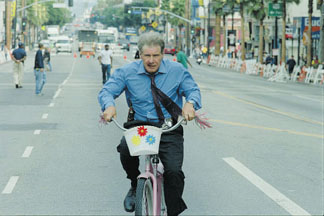Hollywood Hopeful
Old and new boys in blue
By Daniel Kraus

From Air Force One to....this?
Everyone knows Hollywood loves making movies about Hollywood. This is not because people in Hollywood are any more interesting than people in Iowa or Oregon or Maine. This is because some people in Hollywood are lazy and when they look out their window, trying to think of something to write about, they see Hollywood—a city which has little to no similarity or relevance to the rest of the country.
For a while, Hollywood Homicide seems to recognize this in a self-deprecating way. It begins with an impressive montage of signs—road signs, billboards, neon store lamps, all advertising the word “Hollywood.”
For the duration of these opening credits, there is a desperate hope that Hollywood Homicide may become a real critique of Hollywood’s self-obsession—something caustic like The Player or wry like L.A. Story, but better because it doesn’t reward us for being “in the know.”
Sadly, this hope is dashed almost immediately with clichés that are older than the movie’s hero.
Veteran detective Joe Gavilan (Harrison Ford) is sick of all the transvestites and freaks crowding his office—see, Hollywood is hilarious! K.C. (Josh Hartnett), his rookie partner, is also a yoga instructor and budding thespian—see, Hollywood is VERY hilarious!
The triple murder of a budding rap group sends Joe and K.C. on a citywide hunt for clues, a hunt somewhat hampered by K.C.’s constant rehearsing for his upcoming A Streetcar Named Desire performance as well as Joe’s frantic attempts to sell his cash cow house. Meanwhile, a bitter internal affairs agent is doing everything he can to find Joe guilty of misconduct. There’s a love interest, too, but you probably guessed that already.
The buddy-cop genre is a tired one, but even more irritating is the old cop/young cop contrivance, wherein a gruff vet teaches the ropes to a wide-eyed, do-gooding academy grad. When this conflict is relegated to subtext, it can work (Seven, Training Day), but usually it’s a mess (Spy Game, Devil’s Own). For starters, these movies are embarrassing—the younger actor is supposed to show how much respect he has for the older actor, which results in a unique set of problems.
In this case, Hartnett valiantly under-acts and kowtows to Ford’s mere presence. Ford does what any older guy does when lavished with praise—he gets embarrassed and falls back into the tried and true mannerisms and shy jokes that always get him through such unpleasant situations.
Magically, it kind of works. There’s gentleness to Hollywood Homicide that is its greatest (and only) asset. For all the dopey sex play and boring, convoluted plot developments, there’s a delicate touch to the proceedings, as if Ford and Hartnett were the director’s dad and son, and he thought every single thing they did was priceless and deserved a little room to breathe. (For the record, everything they do is NOT priceless, but it’s a tender thought, anyway.)
The film’s easygoing, natural pace is almost totally suffocated by the repetitive, droning bass-and-synthesizer musical score, which would have been better suited to a very special episode of Growing Pains. It cheapens everything, turning a slight, but almost respectable feature into a growing annoyance. There is no good excuse on God’s green Earth for this film to be 111 minutes long.
Especially when easily 90-percent of the film is Ford rolling his eyes and folding his face into exaggerated, Indiana Jones-style frowns. “Dry bemusement” has been Ford’s most overworked acting tool for the better part of two decades, and here it continues to serve him well. But it’s too easy—it’s like when Jack Nicholson arches an eyebrow. It’s just shorthand.
Hollywood Homicide is for Ford completists only and more worthy of a rental than a trip to the multiplex.
If, against better judgment, you’re determined to see it, try to find those charming moments of sophisticated humor that occur on off-beats or play off the comments that aren’t made. It may take a while —and may not be worth the effort—but those moments are there.
HOME | THIS ISSUE | ACE ARCHIVES